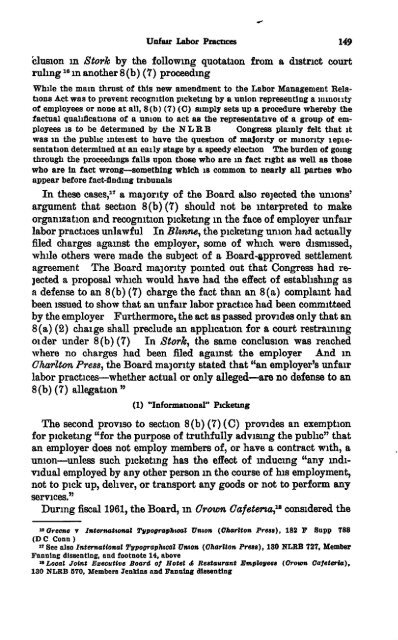TWENTY-SIXTH ANNUAL REPORT - National Labor Relations Board
TWENTY-SIXTH ANNUAL REPORT - National Labor Relations Board
TWENTY-SIXTH ANNUAL REPORT - National Labor Relations Board
You also want an ePaper? Increase the reach of your titles
YUMPU automatically turns print PDFs into web optimized ePapers that Google loves.
Unfair <strong>Labor</strong> Practices 149<br />
'elusion in Stork by the following quotation from a district court<br />
ruling 16 in another 8(b) (7) proceeding<br />
While the main thrust of this new amendment to the <strong>Labor</strong> Management <strong>Relations</strong><br />
Act was to prevent recognition picketing by a union representing a ininolity<br />
of employees or none at all, 8(b) (7) (0) simply sets up a procedure whereby the<br />
factual qualifications of a union to act as the representative of a group of employees<br />
is to be determined by the NLRB Congress plainly felt that it<br />
was in the public inteiest to have the question of majority or minority iepiesentation<br />
determined at an &illy stage by a speedy election The burden of going<br />
through the proceedings falls upon those who are in fact right as well as those<br />
who are in fact wrong—something which is common to nearly all parties who<br />
appear before fact-finding tribunals<br />
In these cases," a majority of the <strong>Board</strong> also rejected the unions'<br />
argument that section 8(b) (7) should not be interpreted to make<br />
organization and recognition picketing in the face of employer unfair<br />
labor practices unlawful In Blinne, the picketing union had actually<br />
filed charges against the employer, some of which. were dismissed,<br />
while others were made the subject of a <strong>Board</strong>-approved settlement<br />
agreement The <strong>Board</strong> majority pointed out that Congress had rejected<br />
a proposal which would have had the effect of establishing as<br />
a defense to an 8(b) (7) charge the fact than an 8(a) complaint had<br />
been issued to show that an unfair labor practice had been committeed<br />
by the employer Furthermore, the act as passed provides only that an<br />
8(a) (2) chaige shall preclude an application for a court restraining<br />
older under 8(b) (7) In Stork, the same conclusion was reached<br />
where no charges had been filed against the employer And in<br />
Charlton Press, the <strong>Board</strong> majority stated that "an employer's unfair<br />
labor practices—whether actual or only alleged—are no defense to an<br />
8(b) (7) allegation"<br />
(1) "Informational" Picketing<br />
The second proviso to section 8(b) (7) (C) provides an exemption<br />
for picketing "for the purpose of truthfully advising the public" that<br />
an employer does not employ members of, or have a contract with, a<br />
union—unless such picketing has the effect of inducing "any individual<br />
employed by any other person in the course of his employment,<br />
not to pick up, deliver, or transport any goods or not to perform any<br />
services."<br />
During fiscal 1961, the <strong>Board</strong>, in Crown Cafeterza,18 considered the<br />
"Greene v International Typographical Union (Marlton Press), 182 F Supp 788<br />
(DC Conn )<br />
"See also International Typographical Union (Charlton Press), 130 NLRB 727, Member<br />
Fanning dissenting, and footnote 14, above<br />
m I Local Joint Executive <strong>Board</strong> of Hotel G Restaurant Employees (Crown Cafeteria),<br />
130 NLRB 570, Members Jenkins and Fanning dissenting

















